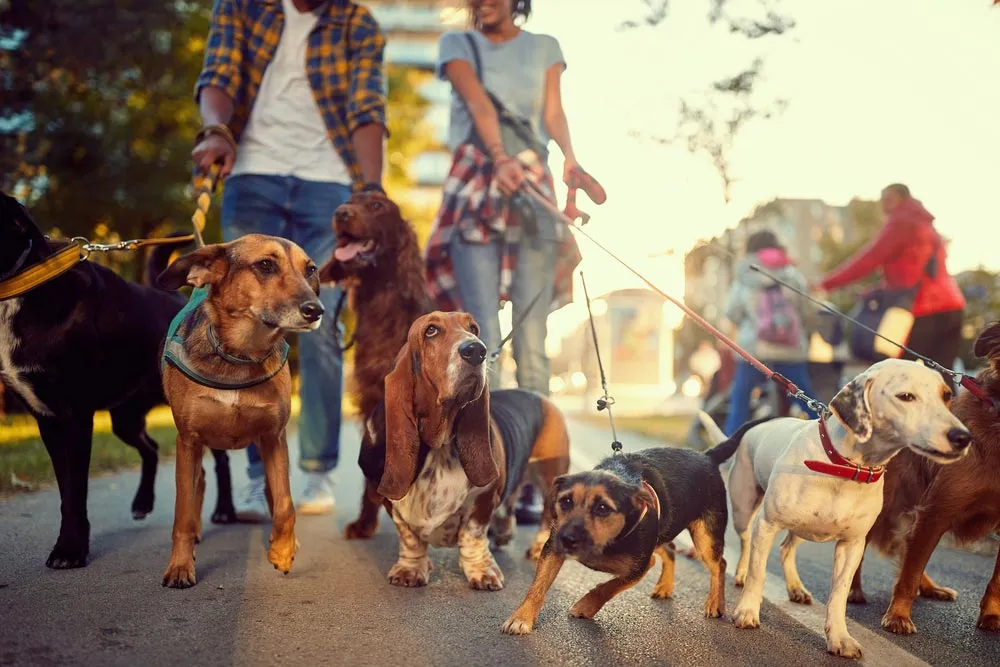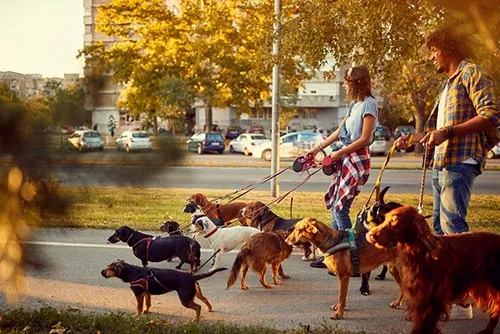The bond between humans and their canine companions in the UK is undeniable, with an estimated 13 million dogs enriching homes across the nation. As dog ownership surged, particularly during the recent pandemic, the demand for reliable dog walking services has become more critical than ever, allowing busy owners to ensure their pets receive the essential exercise and mental stimulation they need. This growing necessity has transformed dog walking into a thriving industry, with many professionals making a full-time living from it.
For pet parents, a key consideration when seeking these services is understanding the financial commitment involved. This article delves into dog walking prices in the UK, with a specific focus on the landscape of 2020 and how rates have evolved since. We’ll explore the average costs, the various factors that influence pricing, practical ways to save money, and crucial tips for selecting a trustworthy dog walker to ensure your beloved companion is in the best hands.
The Landscape of Dog Walking in 2020
While exact average hourly rates for dog walking across the UK in 2020 are not explicitly detailed in some comprehensive reports, we can make an informed estimation based on subsequent years’ data. The average dog walking price for a 45-minute to an hour-long walk was approximately £14 in 2022, representing a 15% increase from the previous year. Extrapolating this trend backwards, the average hourly rate in 2021 would have been around £12.17. Following the same proportional increase, it’s estimated that dog walking prices in the UK in 2020 hovered around £10.58 for a similar duration. It’s important to note that these figures are national averages, and actual prices would have varied by location, walker experience, and specific services offered, a pattern that continues to this day.
In 2020, the UK demonstrated a significant commitment to its pets, with expenditures on pets and related products reaching approximately £8 billion, double the amount spent a decade prior. This spending underscores the cultural value placed on animal welfare and the increasing willingness of owners to invest in their pets’ well-being, including professional dog walking services.
Why Your Dog Needs a Walker
Beyond the companionship they offer, dogs are social creatures that thrive on outdoor activity and exploration. Daily walks provide a rich sensory experience, allowing them to investigate new sights and smells, which is crucial for their mental well-being. Scientific studies consistently highlight that regular exercise is vital in preventing various health issues throughout a dog’s life, from obesity and cardiovascular problems to behavioral issues stemming from pent-up energy. It’s an excellent way to release excess energy, provide necessary mental stimulation, and significantly improve their behavior.
Despite the deep affection owners have for their dogs, life often presents circumstances that make it challenging to provide consistent daily walks. Work commitments, personal obligations, or health concerns can restrict the time available, making a reliable dog walker an invaluable resource. One in three dog owners in the UK reportedly hires a dog walker at least once a week, highlighting the widespread reliance on these professionals. This service ensures dogs receive their much-needed physical activity and social interaction, even when their owners cannot be present. If you’re looking for trustworthy professionals, you might search for certified pet sitters near me to find reputable options.
What Influences Dog Walking Rates?
The cost of dog walking services in the UK is not uniform; several factors contribute to the variation in prices. Understanding these elements can help pet owners anticipate costs and choose a service that aligns with their budget and their dog’s needs.
Walk Duration
The length of the walk is typically the most significant factor in pricing, as time directly translates to cost for the dog walker. While a short 15-30 minute walk might cost around £10, longer walks extending to an hour will naturally incur higher fees. The ideal duration often depends on your dog’s age, breed, and energy levels. Puppies, for instance, may only manage short bursts of activity, whereas a large, energetic breed might require an hour or more of vigorous exercise.
Frequency
Regularity can often lead to savings. Dog walkers typically prefer consistent bookings, and in exchange for assured work, they may offer reduced rates, discounts, or bundled service packages. If your dog requires multiple walks a day or consistent weekly outings, inquiring about these loyalty schemes can significantly lower the overall cost.
Number of Dogs
If you have multiple dogs, the pricing structure can vary. Some walkers might charge the same for an additional dog, while others may offer a discounted rate for the second (or third) pet. Group walks, where several dogs are walked together, can often be more cost-effective per dog and provide valuable socialization opportunities. However, if you prefer a solo walk for your pet, expect to pay a premium for the individual attention. Finding local options by searching for dog sitters near me now might also help reduce travel costs.
 A professional dog walker with three dogs on leashes, enjoying a walk in a park.
A professional dog walker with three dogs on leashes, enjoying a walk in a park.
Location
As with many service industries, dog walking prices can fluctuate dramatically based on geographic location. Metropolitan areas and cities with a high cost of living, such as London, typically have higher rates compared to more rural or less expensive regions. Choosing a dog walker close to your home can also help you avoid additional travel expenses.
Loyalty Packages and Memberships
Many individual dog walkers or larger companies offer loyalty programs or membership discounts. These packages are designed to secure regular income for the walker while providing a more cost-effective solution for consistent clients, often calculated on a per-walk basis. It’s always worth asking about these options if you plan to use a dog walker frequently.
Extras and Peak Times
Certain additional services or specific timing can lead to extra charges. After-hours walks, weekend services, or bookings during holiday seasons (such as Christmas) often come with a premium. Furthermore, some walkers might charge extra for services like feeding your dog, administering medication, or spending additional playtime before or after the walk. It’s crucial to clarify these potential extra charges at the outset of your arrangement.
How to Save Money on Dog Walking
While dog walking costs can accumulate, there are several strategies you can employ to minimize expenses without compromising your dog’s well-being:
- Consider Individual Walkers Over Companies: Often, independent dog walkers have lower overheads and may offer more competitive rates compared to larger companies.
- Avoid Peak Times: If your schedule allows, try to book walks during off-peak hours or weekdays, as weekend and after-hours services typically incur additional costs.
- Choose Local: Opting for a dog walker who lives close to you can help eliminate or reduce travel expenses, which some walkers might pass on to clients.
- Inquire About Discounts: Always ask about loyalty packages, discounts for multiple dogs, or special rates for regular bookings.
- Group Walks: If your dog enjoys the company of other canines, group walks can be a more economical choice than solo sessions.
- Utilize Platforms like Petbacker: Services such as petbacker near me or even petbacker singapore (if you happen to be traveling or relocating) can help you compare prices and find deals.
 A golden retriever sitting patiently next to a leash, waiting to go for a walk.
A golden retriever sitting patiently next to a leash, waiting to go for a walk.
Choosing the Right Dog Walker
Your dog is a cherished member of your family, and entrusting their care to someone else requires careful consideration. Beyond the price, ensuring their safety and happiness is paramount. Here are essential questions to ask any potential dog walker:
- Do you have insurance? Professional dog walkers should carry personal liability insurance to cover any incidents, such as your dog causing an accident or injury to a third party. It’s also worth considering your own dog insurance in case of loss or injury to your pet.
- Do you walk with anyone else? Ideally, your dog should receive the walker’s full attention, and they shouldn’t be distracted by other professional or personal engagements during the walk.
- What kind of dogs do you walk in a group? If group walks are offered, ensure dogs are grouped by temperament and size to prevent any potential conflicts or injuries. A large, strong dog should not overpower smaller breeds.
- Do you have a backup plan? In case your regular walker is unavailable due to illness or unforeseen circumstances, it’s good to know if a reliable and insured stand-in will be provided.
- What courses have you taken? A walker with training in animal first aid, behavior, or care demonstrates a higher level of professionalism and expertise.
- Will you follow the guidance in Dog Walker’s Guidelines? Reputable organizations provide guidelines for professional dog walkers, and adherence to these indicates a commitment to best practices.
- Can I see references? Testimonials from other satisfied local dog owners can offer valuable insights into a walker’s reliability and quality of service.
- How long have you been doing this work? Experience often brings confidence and competence, putting your mind at ease.
- What do you do in bad weather? This question helps determine their preparedness for unexpected situations and their commitment to your dog’s comfort and safety.
- What is the rover dog sitting phone number for emergencies? Knowing the emergency contact information for reputable services can be crucial.
Beyond these questions, it’s always beneficial to meet the dog walker in person to observe their interaction with your dog. A good walker will be affectionate and authoritative, taking the time to understand your dog’s specific needs before their first walk together.
 A smiling dog walker interacting with a small dog during an outdoor session.
A smiling dog walker interacting with a small dog during an outdoor session.
Final Thoughts
Navigating the world of dog walking services involves balancing cost with quality. While dog walking prices in the UK in 2020 were estimated around £10.58 per hour, rates have steadily increased, reaching an average of £14 by 2022. By carefully considering the factors that influence pricing, actively seeking ways to save money, and diligently vetting potential walkers, you can find a service that offers excellent value and peace of mind. Remember to check reviews and potentially visit a service’s location to ensure it meets your expectations and provides the best possible care for your canine companion. The right dog walker is an invaluable partner in ensuring your dog leads a healthy, happy, and well-exercised life.
